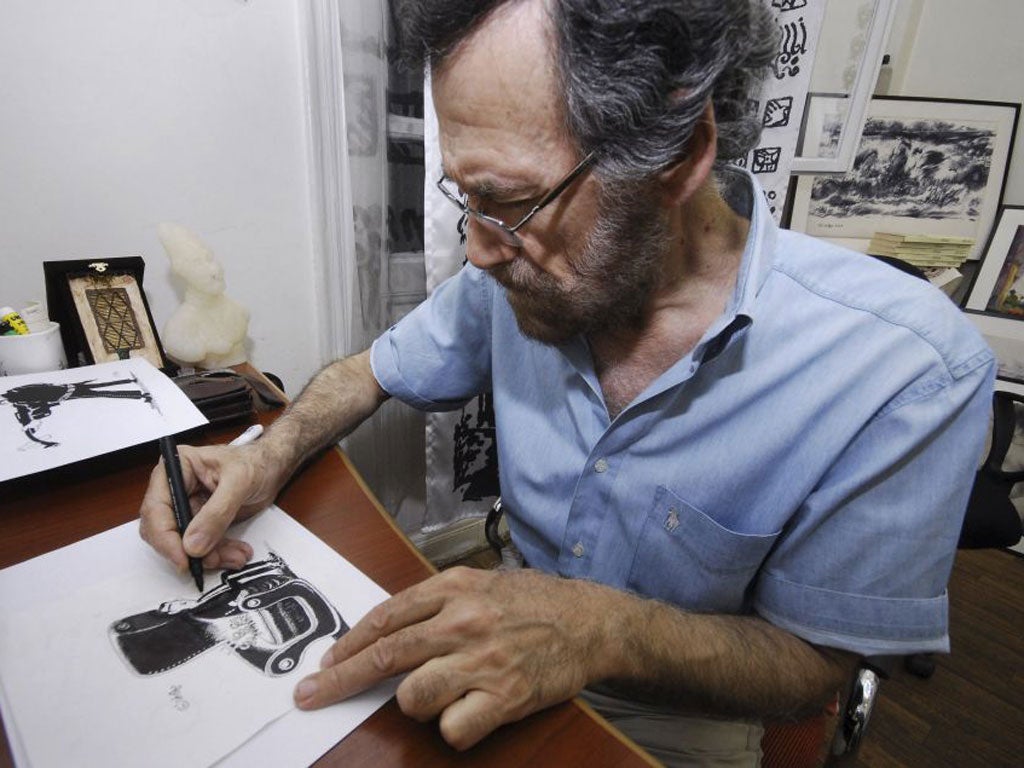Ali Ferzat: The pen fighting Assad's sword
Ali Ferzat's satirical cartoons about Syrian politics led to a beating by militia loyal to the regime, but he has not been silenced. Laurens Cerulus meets him

Your support helps us to tell the story
From reproductive rights to climate change to Big Tech, The Independent is on the ground when the story is developing. Whether it's investigating the financials of Elon Musk's pro-Trump PAC or producing our latest documentary, 'The A Word', which shines a light on the American women fighting for reproductive rights, we know how important it is to parse out the facts from the messaging.
At such a critical moment in US history, we need reporters on the ground. Your donation allows us to keep sending journalists to speak to both sides of the story.
The Independent is trusted by Americans across the entire political spectrum. And unlike many other quality news outlets, we choose not to lock Americans out of our reporting and analysis with paywalls. We believe quality journalism should be available to everyone, paid for by those who can afford it.
Your support makes all the difference.Ali Ferzat is Syria's most renowned cartoonist. His work has become an iconic feature of the Syrian revolutionary movement; his cynical caricatures of Syrian President Bashar Al-Assad and Arab dictators have mocked repression and corruption all over the Middle East, and Arab Spring street protesters have held up his work in their fight for freedom.
The cartoonist was forced to leave Syria after he was assaulted by masked gunmen on his way home from his former studio in Damascus in August last year.
Dragged from his car, driven to the city's outskirts and beaten up, government militia broke his fingers while shouting their purpose – that Mr Ferzat would not be able to harm Assad's reputation any more.
However, now based at a new studio in Kuwait, Mr Ferzat has not been silenced. "I saw this [attack] coming," Mr Ferzat says, leaning across the table of a hotel lobby in Brussels. "The cartoons I drew on the corruption and repression of the Syrian regime were the most courageous I have ever made. When I draw, it is like a voice is shouting inside of me. At the start of the protests I felt like I was possessed, like I wasn't in control of my own body anymore. The voice inside was stronger than ever before."
The cartoonist, now 61, has published over 15,000 drawings in Arab and international press over the decades. On his recent visit to Brussels, Mr Ferzat was awarded the Sakharov Prize for freedom of thought by the European Parliament, which honoured him as one of the leading figures in the Arab spring.
"The revolution [is] a recognition of humanity, a fight for freedom and democracy," he stressed to the audience. "We don't have a party programme to distribute."
While his cartoons have mocked Assad more and more directly since the protests began in March 2011, Mr Ferzat feels he has always been at the forefront of the struggle for freedom of expression.
"I started drawing at the age of five," he says. "I wasn't aware that I could actually draw but I felt I had a strong feeling for sarcasm. I had a sarcastic vision on things."
As part of the Syrian intellectual elite, Mr Ferzat had been a prominent advocate for freedom of speech during the rule of Bashar al-Assad's father, Hafez al-Assad.
But when Bashar al-Assad succeeded his father as president in 2000, Mr Ferzat said there was a brief moment of hope, dubbed the Damascus Spring, which accompanied Assad's early years in power.
In 2001 – and with Assad's encouragement – Mr Ferzat co-founded al-Doumari ("The Lamplighter"), the first independent publication since the last had closed in 1963. "It was a time of optimism," he remembers.
In the past, Mr Ferzat has even described "a friendship" blossoming between himself and Assad during this time, with the president even attending Mr Ferzat's exhibits. But as al-Doumari printed its stinging critique of government corruption and issued calls for sweeping reforms, the relationship, and Assad's enthusiasm for the magazine, soured.
"All of the sudden the government rejected our critical tone and closed it down," he says. The paper was taken off the newsstands in 2003. "The group of reformists that founded al-Doumari have fled the country or are in jail."
In 2007, Mr Ferzat foresaw that a "monumental crisis" awaited Syria if the Ba'ath party continued in its mission "to deprive other national parties of true and effective participation".
That crisis arrived last year when street protests made way for the ongoing military conflict between rebel groups and the Syrian army that has claimed more than 30,000 lives since the uprising began 19 months ago.
However, Mr Ferzat's faith in the revolution has not wavered. He believes the regime itself is weak, propped up by external powers.
"Let me ask you a question," he says, leaning closer across the table. "Who is behind the Syrian regime, you think? The regime doesn't exist anymore – it is a myth. Today, the revolution is against outside powers: China, Russia, Iran, Hezbollah. If Assad was on his own, we would have toppled the regime in two months."
If one positive has come out of this bloody conflict, it is that the struggle against repression has reached a point of no return, he says.
"The revolution was won 18 months ago, when the wall of fear was broken down," he says. "We will never return to the state of fear and terrorism that existed up until then."
"For years, the regime has hampered opposition parties... Today, everybody is revolting. Everybody is a victim of the repression. What we see happening today is the prize we have to pay for freedom."
Join our commenting forum
Join thought-provoking conversations, follow other Independent readers and see their replies
Comments